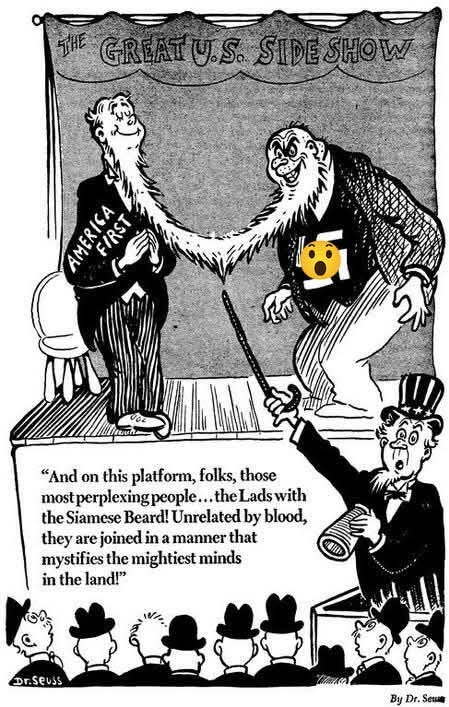Dr. Seuss Warned Us, But Here We Are
Dr. Seuss didn’t just write about quirky creatures and impossible breakfasts—he was a political cartoonist who spent the early 1940s peeling back the polite veneer of American nationalism to expose the rot underneath. Before he was rhyming about cats in hats, Theodor Seuss Geisel was ripping into isolationists, Nazi sympathizers, and the elites who thought Hitler was just a strong leader with some unfortunate PR problems.
One of his most brutal cartoons, The Great U.S. Sideshow, is as relevant today as it was when it first ran. It shows a man in an America First suit standing next to a Nazi, their beards twisted together like ivy choking the same dead tree. A carnival barker gestures at them, inviting the crowd to be baffled by their connection, as if history hasn’t already spelled it out in bold letters. Seuss’s message was clear: America First was never about protecting the country—it was about turning a blind eye to genocide, wrapping cowardice in patriotism, and pretending neutrality wasn’t the same as complicity.
Fast forward to 2025, and the same game is being played with new players. Donald Trump is back in the White House, louder, meaner, and with fewer checks on his power. America First is no longer just a campaign slogan—it’s an operating manual for dismantling democracy, silencing critics, and rebranding authoritarianism as patriotism. Meanwhile, Elon Musk perches above it all like a self-styled tech messiah, using his digital empire to spread whatever conspiracy theory boosts his influence that week.
Seuss saw this kind of thing coming. He knew that fascism doesn’t just march in wearing jackboots—it seeps in through the cracks, dressed up as common sense, economic stability, and national pride. His cartoons weren’t just about World War II; they were warnings about the kind of people who cling to power by selling fear. And if he were alive today, he’d probably be sketching Trump and Musk as two overgrown toddlers hoarding their wealth and making a complete mess of the place while the rest of us are forced to clean up after them.
The difference between 1941 and now? Seuss still had faith that America would wake up before it was too late. These days, it’s getting harder to say the same.



Here are some of Agent Krasnov's supporters. https://www.facebook.com/reel/443864455386930
I love the hard-ass side of Dr. Seuss. I’ve seen a wee bit of his early work, but never this particular and grimly appropriate-to-now piece. Thanks for putting it up here— and now I’m going to go looking for more!
p.s. I just went back and read your essay more thoroughly, and see I’d missed the last paragraph—you’re exactly right. Alas for the USA.